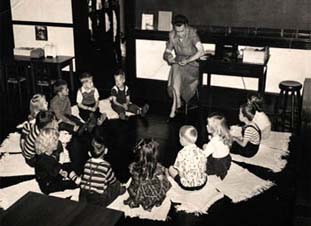 In 1935, a new faculty member moved to Appalachian State Teacher's College from Mississippi, Miss Lucy Brock. Miss Brock came to teach classes in Home Economics at the college. Classes in this area had been offered as electives since 1915. Miss Brock was to have a profound impact on this small community of Boone, NC and upon graduates in Home Economics.
In 1935, a new faculty member moved to Appalachian State Teacher's College from Mississippi, Miss Lucy Brock. Miss Brock came to teach classes in Home Economics at the college. Classes in this area had been offered as electives since 1915. Miss Brock was to have a profound impact on this small community of Boone, NC and upon graduates in Home Economics.
Around 1940, three major events took place. A Department of Home Economics was established at the college to offer a B. S. degree and certification for teaching in Home Economics. Miss Brock became the first chairperson of the department, and the preschool laboratory program, later named in honor of Miss Brock was begun.
Preschool Program
This preschool program was created with two objectives. The first was to offer the Home Economic Majors hands-on experiences of working with young children to enhance their knowledge of child development. The second objective was to give quality early experiences to the local children that would prepare them for public school.
First Building
The first Lucy Brock Lab was held in the Home Economics Building that stood on the present site of the Administration Building. This building housed classrooms, the preschool, apartments for home management students, Miss Brock's apartment, and a swimming pool for the children.
Development of the Lab
Over the years, many changes have been made to the program. In 1967, a new preschool building was built next door to the L. S. Dougherty Building. In 1984, the department took over the early childhood classroom in Sanford Hall, previously used by the College of Education. For 27 years, until 1994, Ms.Joyce Stines directed Lucy Brock. Under her leadership, the program achieved accreditation by the National Association for the Education of Young Children.
From 1994 until 2000, Dr. Ellen Carpenter directed the lab and the two classrooms were renamed Lucy Brock Upstairs and Lucy Brock Downstairs to emphasize the fact that both the half-day preschool and full-day early care and education programs served the objectives envisioned by Ms. Brock--a cutting edge, hands-on learning environment for child development students and a high-quality program for the young children of Watauga county.
Recent Years
In January 2000, Lucy Brock Child Development Lab entered a new era. Under the direction of Dr. Patricia Hearron, the program expanded its schedule of operation, as well as the age ranges of children, served.
The program is now currently located next to the Reich College of Education. The classrooms are no longer referred to as Lucy Brock Upstairs and Lucy Brock Downstairs as the program exists in one space now. The rooms are referred to as the Infant/Toddler rooms and the Preschool room, which reflects the composition of each room. The classrooms of LBCDL continue to explore the ideals and principles developed over the last half-century in the northern Italian town of Reggio Emilia, recognized worldwide as a model of excellence in early childhood education.
In 2014, LBCDL opened its first-ever off-site collaborative school at Parkway Elementary School. In 2017, LBCDL opened its second off-site collaborative school at Blowing Rock Elementary School and in 2018, LBCDL, opened its third off-site collaborative school at Cove  Creek Elementary School. These additional classrooms provide both a valuable service for families and a great setting for training new professionals for careers in child development. It fits perfectly with Lucy Brock's goal of applying and modeling best practices for child development in a real-world setting.
Creek Elementary School. These additional classrooms provide both a valuable service for families and a great setting for training new professionals for careers in child development. It fits perfectly with Lucy Brock's goal of applying and modeling best practices for child development in a real-world setting.
In recent years a transition in the administrative structure of LBCDL has also occurred. The program currently has a full-time director, Dr.Andrea Anderson and faculty are represented through the leadership of the Family & Child Studies department faculty. LBCDL continues its mission to model currently evidence-based practices in the field of early childhood education, as well as to apply innovative approaches that will eventually contribute to new definitions of recommended practices.
During the 100th anniversary celebration of the University in 1999, the Lucy Brock Alumni Association was created. The Lucy Brock Alumni Association, created during this celebration, is comprised of the children who have been such an important part of our program as well as former and present faculty and child development students at the University. Alumni and friends of the Lucy Brock Child Development Lab are invited to share reminiscences and photographs for inclusion in the program's historical archives.